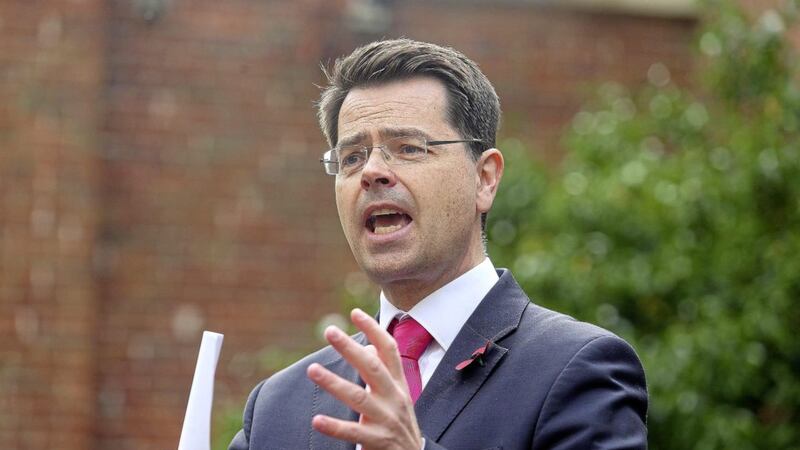Shamelessly obvious attempts are underway to turn budget pressures into political pressures then apply them to weak points in the system. Money has been found for public sector wage increases, for example, then left sitting to be signed off by devolved ministers.
The public sector unions have asked why the secretary of state can take some budget decisions but not this one. Unions have had a dig at civil servants on the same basis. Schools are now warning they may introduce half-day closing to save money, although they are also citing the low-level teachers strike that has rumbling away since last year. So this particular pressure ultimately falls on parents. Still, what does democracy mean without consequences?
**
A reported solution to the Brexit border will apply further pressure on Sinn Féin. EU leaders have apparently accepted a British proposal to devolve a package of powers to Stormont, enabling regulatory convergence with the EU and hence avoiding a customs frontier. This would require the geniuses who could not cut-and-paste one simple UK heating scheme to successfully shadow vast swathes of complex EU law. However, that is the long-term challenge. The short-term challenge is getting devolution back in the first place. Without it, Sinn Féin will face the accusation of neither turning up at Westminster to prevent Brexit nor turning up at Stormont to solve it.
Does Sinn Féin want a solution to Brexit? The DUP is also unhappy at the reported plan, with Sammy Wilson MP issuing the utterly credible threat to make Jeremy Corbyn prime minister.
**
A timely report from the European Parliament’s constitutional affairs committee has recommended that the North-South Ministerial Council (NSMC), a key body of the Good Friday Agreement, be given beefed-up powers to manage all border issues, including trade. NSMC is already empowered under the agreement to discuss EU matters related to its remit and Brexit dominated its final meeting last November before Stormont collapsed. It would be the ideal forum, especially from a nationalist perspective, to develop all-Ireland regulatory convergence. But only if there are northern ministers for southern ministers to meet.
**
Sinn Féin MP Chris Hazzard has warned of “civil disobedience” at the border if any physical customs infrastructure is installed. Civil disobedience is a dog that has rarely barked in Northern Ireland’s history, given how much might have been expected and how effective it could have been. Perhaps this is because people are unclear what it involves. Judging by unionist and nationalist reaction to Hazzard’s remarks, it seems we all think civil disobedience is our own side’s self-help and protests or the other side’s crimes and violence.
In fact, the whole point of civil disobedience is that it falls into the grey area between.
**
Labour MP and hardcore Brexiteer Kate Hoey, formerly of this parish, has been mockingly compared to Donald Trump for saying Ireland should pay for any hard border.
However, another member of Westminster’s Northern Ireland affairs committee is playing Trumpesque games and getting away with it. Ian Paisley has garnered lurid headlines for saying the British government should “stop pussyfooting around” with the Republic, which he accused of acting “disgracefully”. At least he did not call it Mexico.
Paisley’s colourful pronouncements tend to be reported as the view of the DUP, yet he no more speaks for his party than Hoey speaks for Labour and everyone at Westminster knows it. Northern Ireland’s media just cannot resist implying otherwise.
**
Relatives of Shankill bomb victims were understandably distraught by a Channel 4 trailer for an American sitcom that appeared to make light of the atrocity, with a line about “taking down a couple of fish and chip shops to be free of British rule.”
Channel 4 removed the offending item but did not explain how it arose, which was perhaps a mistake, given that no offence can have been intended. The sitcom scriptwriters were almost certainly referring to a 1998 episode of the Simpsons, in which a British-themed fish and chip shop was targeted by drunken St Patrick’s day rioters. Tasteless - but far from a deliberate allusion to the Shankill bomb.
**
Ministerial direction was apparently not required for NI Water to buy out four treatment plants built a decade ago under public-private partnerships. Peter May, the top civil servant at NI Water’s supervising Department of Infrastructure, explained that government money was tight when the original investment was needed but now it makes sense to bring the facilities under public ownership. Even if that argument is accepted - and government’s record of borrowing via the private sector at commercial rates suggests it has never been value for money - an strangely opposite situation now applies. Stormont is sitting on an enormous pile of cash, massively boosted again by last month’s indirect rule budget, all earmarked as ‘financial transactions capital’. This can only be used if it is lent to the private sector at commercial rates for public-private partnerships. Firms must pay it back with interest but government and service users must still pay them enough to do this and make a profit.
The question of why private firms cannot just be hired and paid the old fashioned way remains as mysteriously unanswered as ever.
newton@irishnews.com









